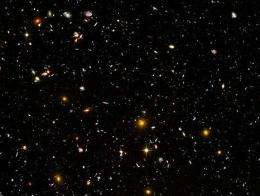August 14, 2013 weblog
Cosmologist suggests universe might not be expanding after all

(Phys.org) —Cosmologist Christof Wetterich of the University of Heidelberg has uploaded a paper to the arXiv server in which he claims it's possible that the theory of expansion of the universe might be incorrect. He suggests instead that the redshift observed by researchers here on Earth might be caused by an increase in the mass in the universe.
For nearly a century, the consensus among astrophysicists has been that the universe started with a Big Bang and has been expanding ever since. This hypothesis formed because researchers found that in analyzing the light emitted from stars, a redshift occurred—where its frequency changes as an object that emits light moves away from us. But Wetterich says the redshift might me due to something else—an increase in the total mass in the universe.
Wetterich's idea is that light emitted from an atom is governed by the mass of its particles—if that atom were to become larger in mass, the light that it emits would change in frequency as its electrons became more energetic. More energy would appear as light moving toward the blue spectrum, while less energy (an atom losing mass), would move toward the red spectrum. Thus, Wetterich reasons, if the mass of observable objects were once less, we would now see them with a redshift as they expand. If his line of reasoning is true, Wetterich says it's possible that the universe is actually contracting.
Wetterich's paper hasn't been peer reviewed yet, but thus far, comments by others in the field suggest openness to this new line of thinking. That might be because one exciting prospect of this new theory is that it would do away with the idea of a singularity existing just before the Big Bang—a point at which conventional physics breaks down. Instead it might suggest that the universe is simply in a constant state of flux with no real beginning and no real end.
Unfortunately, Wetterich's theory can't be tested because of the relative nature of mass. Everything we are able to see has a mass that is relative in size to everything else. Thus if it's all growing, we wouldn't have anything to measure it against to see that it's happening.
More information: A Universe without expansion, arXiv:1303.6878 [astro-ph.CO] arxiv.org/abs/1303.6878/
Abstract
We discuss a cosmological model where the universe shrinks rather than expands during the radiation and matter dominated periods. Instead, the Planck mass and all particle masses grow exponentially, with the size of atoms shrinking correspondingly. Only dimensionless ratios as the distance between galaxies divided by the atom radius are observable. Then the cosmological increase of this ratio can also be attributed to shrinking atoms. We present a simple model where the masses of particles arise from a scalar "cosmon" field, similar to the Higgs scalar. The potential of the cosmon is responsible for inflation and the present dark energy. Our model is compatible with all present observations. While the value of the cosmon field increases, the curvature scalar is almost constant during all cosmological epochs. Cosmology has no big bang singularity. There exist other, equivalent choices of field variables for which the universe shows the usual expansion or is static during the radiation or matter dominated epochs. For those ``field coordinates`` the big bang is singular. Thus the big bang singularity turns out to be related to a singular choice of field coordinates.
via Nature
Journal information: arXiv
© 2013 Phys.org

















